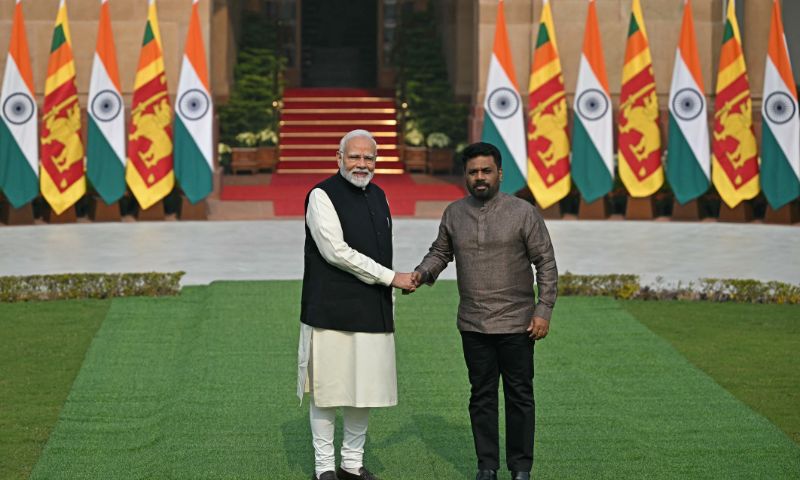
- One of the major agreements was the establishment of a joint working committee to enhance cooperation in agriculture and focus on strengthening Sri Lanka’s digital economy.
- An agreement to restart ferry services between Rameswaram and Talaimannar was reached, further strengthening connectivity between the two countries.
- President Anura is scheduled to visit China as it is crucial for Sri Lanka to maintain cordial ties with both China and India.
The newly elected Sri Lankan President Aruna Dissanayake paid his first foreign visit to India this week. This visit follows his landslide victory in the recent Sri Lankan presidential elections, where, for the first time, a left leader was elected, overthrowing the dynasty politics of the Rajapaksa and the Wickremesinghe.
The newly elected Sri Lankan President, Aruna Dissanayake, belongs to the Janatha Vimukthi Peramuna (JVP) party. The JVP is considered to have a pro-China stance. When Aruna won the election, there were speculations about what his foreign policy towards India would be, given India’s importance in the region and its strategic rivalry with China. However, his official visit to India has bridged these differences, signalling that his presidency will lean towards pragmatism.
President Anura signed various Memoranda of Understanding with Prime Minister Modi during his visit to India. One of the major agreements was the establishment of a joint working committee between the two countries to enhance cooperation in agriculture. Additionally, the Indian government committed to focusing on strengthening Sri Lanka’s digital economy.
Discussions also took place on defence and energy cooperation. It was agreed to establish an electricity grid connection and multiple petroleum pipelines, including one connecting India and Sri Lanka. Furthermore, agreements on economic and technological collaboration between the two nations were signed.
However, one of the key unresolved issues remains the dispute concerning the fisherman community. The Sri Lankan government emphasized that the community should resolve the matter, while Indian Prime Minister Modi stated that the issue should be addressed with a humane approach. President Anura assured that he would initiate talks with the fisherman community to seek a solution. Additionally, an agreement to restart ferry services between Rameswaram and Talaimannar was reached, further strengthening connectivity between the two countries.
One interesting aspect of the meeting between the two leaders was that Indian Prime Minister Modi did not make any reference to the 13th Amendment, which discusses granting autonomy to Sri Lanka’s provincial councils. In the past, India has consistently advocated for the implementation of the 13th Amendment in Sri Lanka, but this time, it was notably absent from the discussions.
During Sri Lanka’s economic crisis, India offered $5 billion in economic support to help stabilize the nation. President Anura assured that his policies would not create a scenario where anti-India activities could emerge in Sri Lanka. The meeting was marked by pragmatic discussions, and it highlighted continuity in India-Sri Lanka relations. Importantly, this visit signalled that there would be no significant shifts in Sri Lanka’s approach towards India.
After he visits India, President Anura is scheduled to visit China. The Chinese influence in Sri Lanka is significant, marked by substantial economic investments and a strategic presence. Over the past two years, there has been a consistent presence of Chinese maritime military ships in Sri Lanka. While China claims these ships are for general purposes, such as scientific observation, there are concerns that they may also serve defence purposes, including monitoring India’s military activities.
For Sri Lanka, it is crucial to maintain cordial ties with both China and India. By balancing relations with these two major powers, Sri Lanka could reap significant geopolitical benefits. However, siding too heavily with one over the other might lead to complications, as seen in the case of the Maldives.
In the Maldives, President Muizzut adopted a strongly pro-China stance, sidelining India. This led to severe economic challenges for the Maldives, leaving the nation with no choice but to reverse its anti-India narrative and rebuild ties with India to restore stability. Sri Lanka must learn from such examples to avoid similar pitfalls.
Aayush Pal is a freelance writer on contemporary geopolitical developments. The views expressed in his work are entirely his own.
